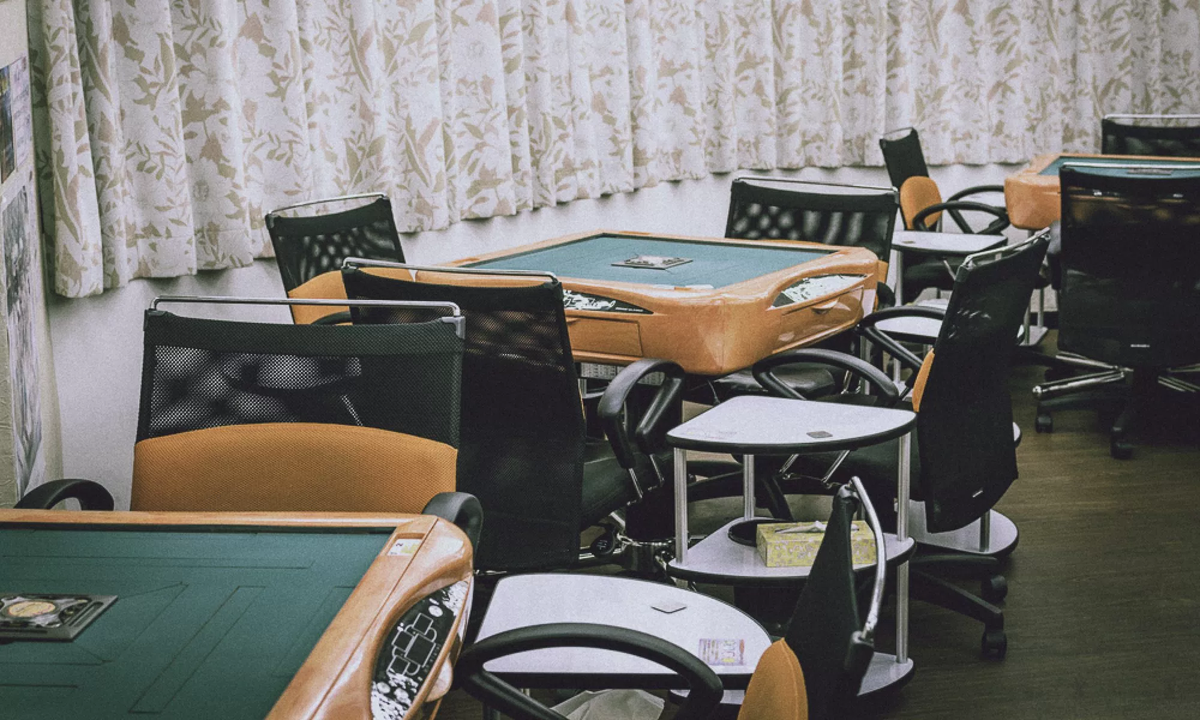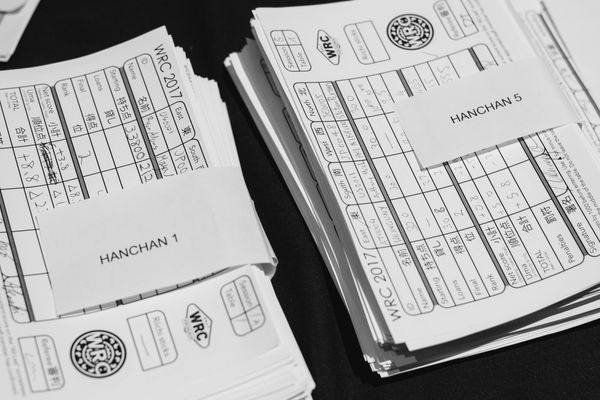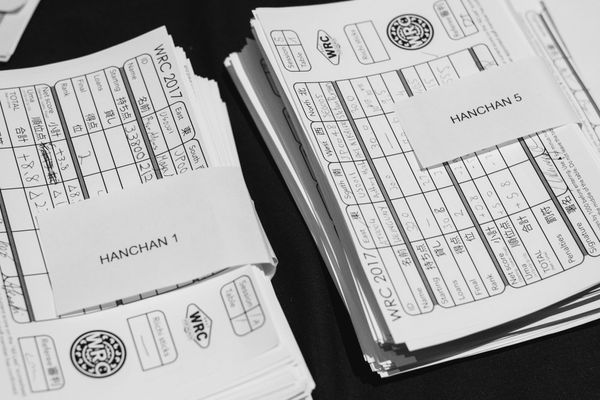Life as a mahjong parlor member

A long time ago we explained what a mahjong parlor is.
Today we start a new column where we’ll delve further into it and analyze those mysterious creatures that dwell inside them. No, not the customers, but the people that work to keep the act together. Parlor members. Me being one of them, and I’ll tell you all there is to know about what happens in the depths of mahjong parlors.
In Theory
What is a parlor member?
And what do they do?
Parlor members are the employees of a mahjong parlor and it’s their job to make sure that everything within that parlor is going fine. They greet you on your way in and out, deliver drinks on request, bring you hot/cold towels, seat you at the table, collect the table rake, change the ashtrays, clean the cups and dishes, store your bags and coats, among many other such services and of course they also sit to play as substitutes or fillers.
Substitutes
This is called “daisou” (代走) in Japanese. If you have to momentarily leave the table during a game, you may do so by calling a susbtitute. This frees you up to take phone calls, go the bathroom or take care of pretty much any other short term interruption. A parlor member will take your place and play your hand while you’re not there. All you need to do is shout “daisou!” or “pinchi!” and it will be taken care of. Every point/chip expenditure will be deduced from your stash and the staff isn’t held responsible for whatever loss that happens.
Fillers
“Filling in”, or “honsou” (本走) in Japanese, is when a parlor member sits to play as an extra player. This is different from substitution in the sense that the parlor member is using his own (or sometimes the store’s) money. Now, there are mixed views on this. Some customers don’t like playing parlor members while others love it. Whichever the case, this is the main job of a parlor employee and it’s what makes or breaks a parlor member. Whether they can manage to have good manners, ensure the game moves smoothly, entertain you and keep their losses to a minimum all at the same time is what differences a good parlor member from a bad parlor member.
In Practice
I’ve been a parlor member in Osaka for almost two months now. And I’ll give you some of the nitty gritty.
Substitutes
Even though the store isn’t held responsible by whatever happens while you’re getting subbed, it would be a problem if the parlor member just went on a rampage and kept winning hands, or at the contrary if he started giving away everyone’s winning tiles willy-nilly. That’s why, when you ask for a substitute, you have to understand that your sub will not try to win the game for you. His job is to be invisible. He won’t chi, he won’t pon and he most certainly won’t call riichi. It depends on the store, but it is also possible that he will not call ron either. He’ll try to keep your hand in a manageable state, all while avoiding to deal into somebody else and keeping your options open. His first priority is losing as few points as possible (not win them). That’s why it’s pretty hard to sub; you’ve to consider many things other than just “getting to tenpai”. Once you, the customer, come back, you’re free to riichi or push or do whatever you want. And if he did win you a hand, or got you a nice tenpai, be sure to tell him he’s done a good job before you leave. It makes a world of difference.
There is, however, a cheat code you can activate to make the member play serious. When he fills in for you, just tell him straight out “You can do as you please.” Depending on how strict the store is with their members, you might just have released him from his “substitute” prison and now he might actually try to actively win the hand for you and take any necessary risks. Also, sometimes members might temporarily sub for other members who’re filling as well; don’t get caught off-guard when they start going aggressive and calling tiles, because when we sub for other members we will usually play ‘normally.’
Fillers
I mentioned that this is what makes or breaks a parlor member. There’s a reason why parlor members are usually strong and why not every mahjong junky is a parlor member (because, hey, who wouldn’t like to get paid to play mahjong!).
Almost every store adopts the “you’re responsible for your losses” system. Which means that they will compute how much you lose and deduce that from your salary. Most of the time this also includes the rake; almost every store nowadays makes their employees also responsible to pay for the table rake of the games they play. I’ve mentioned this in the other article, but no matter how strong you are, beating the table rake is a VERY difficult task and requires you to play high rate at a very high level of play. One of my friends is 9 dan in Tenhou and works at a Tenpin (1.0) jansou; last month he finally evened out the table rake for the first time, which means he kept his entire salary intact. Breaking even is that difficult. Parlor members usually get paid minimum wage, which means it’s not even that rare for high rate parlor members to lose more than they make.
Usually a store would prohibit you from filling in games if they see you’re about to lose more than your salary and just have you do the whole “drink re-filling” job for a while. Other stores might not care as much and let you fall in the negative. Your losses are called “outs” (アウト) and when you’ve lost more than your “allowed limit” it’s called “out-over” (アウトオーバー). An out-over member is a liability for the store; they’re more likely to show up late (or not show up at all), cause trouble and eventually quit. When a member quits from losing too much, they usually say he went bankrupt or flew away (tobi 飛び). This is an everyday thing at high rate parlors. It’s a system where only the strongest remain.
If you can keep a steady winning record at a high rate parlor, it is possible to go into “black numbers” (positive) instead of the “red numbers” (negative) every month. A parlor member who is positive every month is called a Pure Black Member (純黒メンバー) and to achieve that title, among parlor members, is a dream comparable to becoming Tenhou’i or winning the World Series of Mahjong. Pure Black Members are extremely rare to find (not racist, I know what you’re thinking).
Average members just lose a little less than the table rake every month. This is fine as well. As long as you’re losing less than the table rake, you can feel good about yourself (barely).
Limitations
However, you must remember that playing as a member is different from playing as a customer. You’re supposed to maintain perfect manners, check everyone’s winning scores, have a general sense of idea of what’s going on with the tables around you (how many members are available on the hall? are there customers waiting? did table 2 finish the game and you’ve to thank them for the game?) and abide by some store limitations and some special manners.
The limitations (制約 seiyaku or 制限 seigen) will vary from store to store, but they’re put in place to minimize the chance of conflict between the customers and the store. These limitations may include things that go from common sense to more complex and meaningless restrictions.
-Don’t discard the third set of sangenpai after someone has called two. If you might discard it after you riichi, then you can’t riichi.
-Don’t win a hand in oorasu if it doesn’t improve your placement.
-Don’t dama with a mangan; riichi to let others know you’re tenpai.
-You can’t wait on the suji of your riichi tile (ex: discard 4 and wait on 1 or 7)
And many others. The more restrictions your store has, the harder it will be to manage to win. The important thing is not only to abide by these limitations, but also to make sure the customers don’t figure them out. If they found out what your limitations are, they could use them against you. Also, the game stops being fun, even for them as customers. There are stores with no restrictions or very lenient ones. If you ask members they will usually tell you “no, I don’t have any restrictions.” This is usually a lie.
Not exactly restrictions…
While not forced to, some veteran members also adopt a playstyle that’s convenient for them or the store. For example, a member who’s filling in may give his place away to a customer that has just entered the store, provided it’s a reasonable situation to do so (still East round, dealer turn available, most people around the 20k point mark). That’s why through East 1 to 3, it’s very important that everyone’s scores remain relatively flat; so that you’re still in position to give your seat away to a customer. If you deal into 12k in East 1, your seat is fucked… Can’t give that seat away to a customer if he walks in. If you won a mangan in East 1, there’s a good chance you’ll have to give your seat away in East 2 still. That’s why some members might go for a more peaceful start of the game and avoid high-risk high-return gambles, adopting instead low-risk low-return choices. This isn’t necessarily everyone, some people still love to go ham from East 1, but it’s also a recurring strategy; especially if you don’t want to play and are willing to give your seat away. I love playing and don’t even intend to give my seat away at any point, so I usually sit at either starting East or South (to get rid of that dealer turn fast and make the seat less desirable, as opposed to starting North or West) and aim for big developments. This isn’t good for the store or for the other members (if you can’t seat the customer at the table, you either have to make him wait or start a new table and fill it with other members if there aren’t enough customers; this can create a problem if there are few members available or if the store is really busy. I’m a selfish member… but in a sense this isn’t entirely bad; other members don’t want to play as much as I do because, as I mentioned in the other article, the more you play the more you’re losing, so they usually have me sit whenever there’s an opening and I will happily take on every single game).
Also, winning many small hands on your dealer turn is looked down upon, especially in South Round. This drags the game on, decreasing the store’s profit. It’s a lot better if you win one big hand on your dealer turn than three small hands in a row.
Of course, this isn’t a highly-regulated or standardized job, every member is different and every store is different.
I’ll go into the specifics on the next post, where I will tell you more about my personal experience in a Japanese parlor (including my winning records and salary). Until then!



